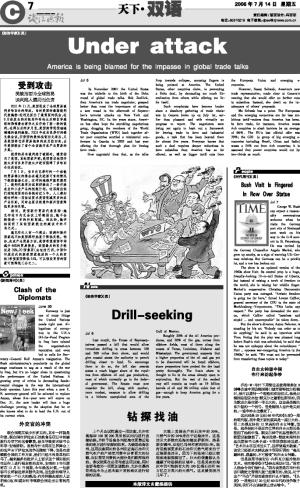Jul 6
In November 2001 the United States was the midwife to the birth of the Doha round of global trade talks. Bob Zoellick, then America's top trade negotiator, grasped better than most the importance of starting a new round in the aftermath of September's terrorist attacks on New York and Washington, DC. In the years since, America has often kept the stumbling negotiations going, dragging the members of the World Trade Organization (WTO) back together after poor countries scuttled a ministerial conference in Cancún in 2003 and last year offering the first thorough plan for freeing farm trade.
How ungrateful then that, as the talks limp towards collapse, accusing fingers is being pointed at America. The United States, other countries claim, is preventing a Doha deal, by demanding too much liberalization from others while offering too little itself.
Such complaints have become louder since a desultory gathering of trade ministers in Geneva broke up on July 1st, earlier than planned and with virtually no progress to report. The negotiators were trying yet again to hash out a framework for freeing trade in farm and industrial goods, a task that has been beyond them for almost five years. Everyone knows that such a deal requires deeper reductions in farm subsidies than America has so far offered, as well as bigger tariff cuts from the European Union and emerging economies.
However, Susan Schwab, America's new trade representative, made clear at Geneva's meeting that she would offer no further cuts in subsidies. Instead, she dwelt on the inadequacy of others' proposals.
Ms Schwab has a point. The Europeans and the emerging economies are far less ambitious tariff-cutters than America has been.In farm trade, for instance, America wants rich countries to slash barriers by an average of 66%. The EU's last official offer was 39%; the G20 (a group of big emerging economies including Brazil, China and India) wants a 54% cut from rich countries; it is assumed that poorer countries would cut by two-thirds as much.

